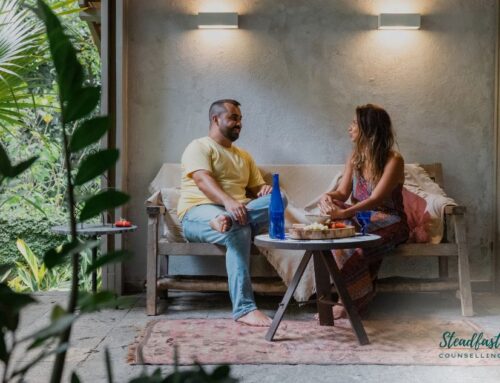5 ways to start the year cultivating connection
As we look ahead to 2016, it’s a good time to reflect on what we want to have, do, feel, experience and be in 2016 – and to start with our most significant relationship – our partner.
The holidays can be busy and stressful with so many commitments taking our time and attention; attending events, shopping and preparing, visiting friends and family, and hosting in-laws from out of town. It’s rather easy to become a bit disconnected from our partner when we’re focused on the holiday to-do list. And if the relationship wasn’t in the best place before the holidays, then the hustle and bustle may be even more of a distraction.
If you’re feeling a bit or more distant and alone in your relationship, now is a good time to put your relationship back on the map, to put it at the very top of your to-do list. Try one or more of these ways to reconnect with your partner and strengthen your relationship.
1. Talk
Talking with each other may seem obvious. But it’s easy for couples to forget to have real conversations. We’re so busy doing all the things that need to be done in our lives and in our families. Discussions can become limited to those things. And the conversations that will steer the course of the relationship fall by the wayside.
Conversation starters
a. What do you want to do this year as a couple? What are your goals or wildest dreams for this year? What is your vision for your relationship? What experiences do you want to create for the two of you? Are there adventures to go on, destinations to explore? Health and wellness pursuits to add? Do you want to spend more time together with friends? Schedule date nights? Or have more “us time” at home?
b. Create a values statement for your relationship. What values are important to both of you? What do those values mean to you and what do they look like within your relationship? When you find yourself out of alignment with your values what actions will bring you back to your values? (Search “list of values” on Google if you want to consider more values than first come to mind for you.)
A 15-minute monologue
On the stage, it’s called a monologue when one person does all the talking. It can help at home too when couples like some structure for their talks. Try this for 15 minutes every day for a week, 2 weeks or a month.
- One person is the talker. The other is the listener and time tracker. The next day you switch roles.
- Talk about yourself and your life, your day, what’s on your mind. Use “I” statements. This is about you, not your partner, and not other people.
- Do not talk about the other person – what they did or didn’t do, what they should or shouldn’t do.
- Don’t police the other person.
- The listener only listens. Using non-verbal cues to show that they are listening.
- At the end of 15 minutes, the listener thanks the talker for sharing. This isn’t intended to be a discussion that takes more time. Rather it’s about taking time to connect with each other; for one person to express themselves and the other person to listen.
This is a great tool to have in your relationship toolbox. At any time that you’re feeling disconnected in your relationship, pull out this 15-minute monologue tool and use it for a week or more.
- For more details about this 15-minute exercise for couples see “Creating a Stronger, Intimate Connection through Conversation and Vulnerability.”
2. Revisit your wedding vows
Take a look at your wedding vows, either written down or in your wedding video. Or recollect as best you can what you said. Treat them as a “living document.” Meaning that they can evolve and adapt to fit your life, hopes and desires now. Are there things you want to add or update? What do your vows look like in action? How are doing at living your vows?
3. Self-evaluation
Take a look at yourself. How are you doing as a partner? How are you participating in your relationship? Are you nurturing? Loving? Listening? Learning new things about your significant other? We all have room for improvement, use the new year as at time to take stock and set some goals.
If you want to improve your relationship, you have the most influence over yourself and your own participation. So focus on what you can do to make things better and I promise you will like the changes you see.
4. Uninterrupted eye contact
Stare into each other’s eyes for three minutes without speaking. Set a timer so you’ll know when three minutes is up.
Pay attention to your thoughts and feelings. How in touch with yourself are you? How do you feel? Hold your gaze regardless of how you feel? How do your thoughts and feelings change the longer you look into each other’s eyes?
After three minutes, share your thoughts with your partner – about your own experience, were there easy parts or hard parts? How connected did you feel before or after?
5. An intimate card game
Create your own deck of sexy or romantic cards; so much more personal and meaningful than a couples card game bought at the store or online.
- Using cue cards, each of you writes 5-10 things you want to try, experience or have more of with your partner. One thing per cue card. Do this independently.
- When all your cards are written, read them out to each other.
- Once a week, pull a card from the deck and do what it says. If there is something on a card that you are uncomfortable with or not ready to try, then that card gets removed from the deck.
In our busy lives, reconnecting with our partner may be as simple as remembering to spend time together. In that case, it’s helpful to have a few ideas, such as the ones listed here.
When couples have trouble spending time together, when there are underlying issues and fears, it can help to work with a couples counsellor to identify the root cause of the disconnectedness and move forward towards the relationship you envision and desire.
Laura Bradley
Laura is a Master Therapeutic Counsellor and a Registered Counselling Supervisor (MTC,RCS,#2022) with the Association of Cooperative Counselling Therapists of Canada (ACCT). She is also a Certified Group Facilitator.







